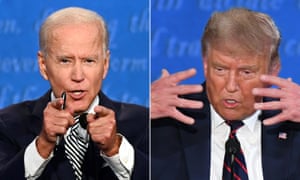This administration is full of plutocrats, CEOs and lobbyists. Yet the 1% see the modern Republican party as a threat

What has kept Donald Trump in the presidential race is his electoral base. It consists of white men, rural and small-town voters and small-business owners. The big bucks for the campaign come from a coterie of wealthy loyalists. This bloc will stick with Trump whatever he says or does.
But the attitude of other groups that one might expect to be Trump’s natural supporters, such as big business, financial markets, a lobby like the chamber of commerce – “capital”, in other words – is far less clear cut. If anything, as Joe Biden’s lead has stabilised, so too has their optimism. With an eye to an impending shift of power, the Chamber of Commerce has endorsed a cluster of Democrats in tight House races, provoking outrage from the president. These unexpected alignments point to the scrambling of assumptions that is characteristic of the Trump era.
The GOP is normally the party of business. The president himself is a businessman. His administration has been stacked with plutocrats, CEOs and lobbyists. It has delivered tax cuts and deregulation. The tax-collecting IRS is a shell of its former self; the Environmental Protection Agency has been gutted, and financial regulations slashed. Trump has packed the courts with judges who will deliver judgments against labour rights, environmentalism protection and business regulation. If, as seemed possible at the beginning of this year, the US economy had stayed on course and the Dems had selected the leftwing Elizabeth Warren or Bernie Sanders as their candidate to run against Trump, the battle lines would have been clearly drawn.
The initial response of the Trump administration and Congress was less dysfunctional than one might have expected. The Cares Act was generous both to ordinary Americans and business. But since April the intractable corona-crisis has brought out the worst in Trump. The culture wars unleashed by Black Lives Matter protests have solidified Trump’s base, but they have not widened his appeal. And, as the public mood has shifted, business leaders have remembered the issues that made them leery of Trump in the first place.
In 2016, Trump struggled to gain endorsements. The Chamber of Commerce was neutral, backing neither Trump nor Clinton. It could not support a Republican candidate who was protectionist on trade, hostile to immigration and openly critical of the Fed chair, Janet Yellen.
Within hours of Trump’s victory on the night of 8 November 2016, that hesitancy was forgotten. Markets boomed. And Trump has delivered the goods in terms of tax breaks and regulatory giveaways. But on the strategic issues he has been every bit as disruptive as could have been imagined. His trade policy has been the most aggressive since the second world war. Relations with China, the big play of US business since the 1990s, are deteriorating into a cold war. Last year, Trump denounced his own Fed chair, the mild-mannered and cooperative Jerome Powell, suggesting he might be more dangerous than Xi Jinping. As recently as the second week of March the markets were jolted by rumoursthat Trump might be about to oust Powell. Meanwhile, Trump exploits the immigration issue for rabble-rousing purposes. American business is as keen as ever on cheap labour and the actual flow of newcomers has slowed to a historic low. The real issue – addressing the racist treatment of Latin American workers in the US – remains unaddressed.
On the climate emergency the attitude of American business has evolved more than one might have expected since 2016. Trump’s boast of reviving the coal industry is evidently absurd. Outright climate denial is no longer the order of the day, even for the likes of Exxon or Chevron. They now favour some kind of carbon tax. The smart money is on renewables as the cheap energy alternative.
If big business were the commanding political force that its critics sometimes imagine it to be, it would come out openly and state the obvious: Trump is a menace, he needs to go.

Leave A Comment